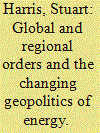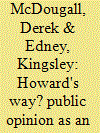| Srl | Item |
| 1 |
ID:
094041


|
|
|
|
|
| Publication |
2010.
|
| Summary/Abstract |
During the third quarter of 2009, there was a spate of reports in the news media and on the Internet accusing Burma and North Korea of engaging in a range of activities that potentially threatened regional security. It was claimed that the Naypyidaw regime had developed a close relationship with Pyongyang that included North Korea's sale to Burma of conventional weapons, assistance in the development of Burma's defence infrastructure and arms industries, and even collaboration on a nuclear weapons program. Given the lack of hard evidence, however, these reports raised more questions than they answered. Burma's nuclear status remains unknown. Another puzzle is why no government or international organisation has yet made an official statement on this particular issue, despite all the publicity it has attracted. Should it be determined that Burma does indeed have a secret nuclear weapons program, then a key question would be whether the generals are likely to be any more receptive to international concerns than they have been in the past, on other issues.
|
|
|
|
|
|
|
|
|
|
|
|
|
|
|
|
| 2 |
ID:
094042


|
|
|
|
|
| Publication |
2010.
|
| Summary/Abstract |
Attention by international relations scholars to the transformation underway stemming from the rise of China has not been matched by that given to the transformation underway in the international energy system. This article looks at three dimensions of that transformation: the end of cheap oil and the rising trend of energy prices; the changing role of the traditional international oil companies and the rise of national oil companies; and the growing energy importance of the Middle East and Russia. It looks at how these changes have already affected or are likely to affect three strategic relationships: US-Middle East; US-China; and Europe-Russia-US. It concludes that more attention needs to be given by scholars to what will be major changes in global geopolitical relationships with considerable consequences for the foreign policies of the major powers.
|
|
|
|
|
|
|
|
|
|
|
|
|
|
|
|
| 3 |
ID:
094043


|
|
|
|
|
| Publication |
2010.
|
| Summary/Abstract |
While a range of accounts have engaged with the important question of why Australia participated in military intervention in Iraq, few analyses have addressed the crucial question of how this participation was possible. Employing critical constructivist insights regarding security as a site of contestation and negotiation, this article focuses on the ways in which the Howard Government was able to legitimise Australian involvement in war in Iraq without a significant loss of political legitimacy. We argue that Howard was able to 'win' the 'war of position' over Iraq through persuasively linking intervention to resonant Australian values, and through marginalising alternatives to war and the actors articulating them.
|
|
|
|
|
|
|
|
|
|
|
|
|
|
|
|
| 4 |
ID:
094044


|
|
|
|
|
| Publication |
2010.
|
| Summary/Abstract |
Using the typology developed by Douglas Foyle, this article argues that John Howard behaved as a 'pragmatist' in dealing with situations where public opinion was relevant to Australia's engagement with Asia. Howard adhered to his own views on the relevant issues while attempting to lead public opinion in the direction he believed desirable. During the 1996-2007 period the most relevant issues relating to the impact of public opinion on Australia's Asian engagement were Australia's relations with Indonesia and Asian immigration. In the case of Australian-Indonesian relations the Howard government had to deal with various situations where an activated public opinion threatened to undermine the long term Australian approach that gave primacy to Indonesian concerns. Political leadership entailed developing a response that the government believed to be appropriate to Australia's long term objectives, while also attempting to persuade the public that this was the case. In the second instance policy developed in a more 'deliberative' context: Howard modified his earlier stance that was critical of Asian immigration, but continued to adhere to a strongly 'integrationist' position. This position was consistent with both his own views and his perception of public attitudes on the matter.
|
|
|
|
|
|
|
|
|
|
|
|
|
|
|
|
| 5 |
ID:
094045


|
|
|
|
|
| Publication |
2010.
|
| Summary/Abstract |
The new human security paradigm has reconceptualised security beyond traditional physical threats to encompass 'lifestyle' concerns, such as health and environmental security. This article uses national survey data collected in Australia in 2007 to examine how public opinion views this new paradigm and to evaluate its political consequences. The results show that the public makes a clear distinction between all four types of human security-health, the environment, national security and the economy. Longitudinal analysis shows that health and the environment have gained greater prominence with the public since 1990. Each dimension of human security has only limited roots in the social structure. However, each has important consequences for the ideological orientation of the public, and for party support. The authors conclude that as 'lifestyle' concerns become more prominent for the public, parties of the right will have to adapt to the new paradigm in order to ensure that they are not electorally disadvantaged.
|
|
|
|
|
|
|
|
|
|
|
|
|
|
|
|